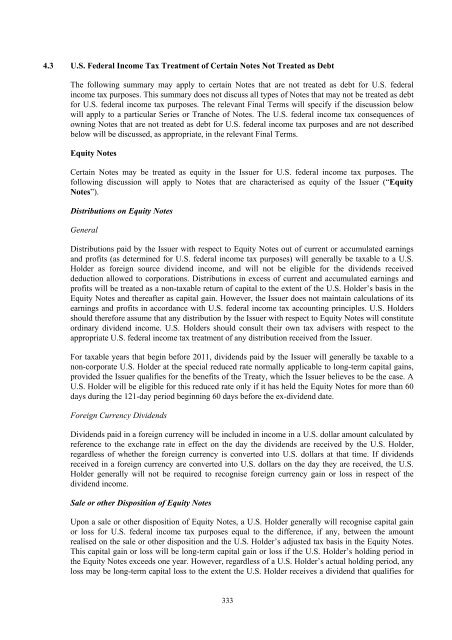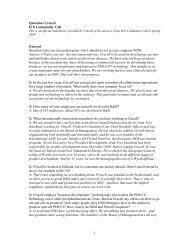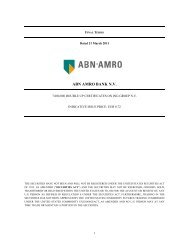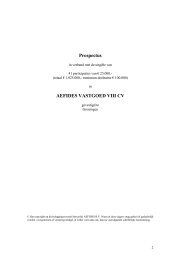Dit prospectus is gemaakt voor de uitgifte van dit product en ... - Iex
Dit prospectus is gemaakt voor de uitgifte van dit product en ... - Iex
Dit prospectus is gemaakt voor de uitgifte van dit product en ... - Iex
Create successful ePaper yourself
Turn your PDF publications into a flip-book with our unique Google optimized e-Paper software.
4.3 U.S. Fe<strong>de</strong>ral Income Tax Treatm<strong>en</strong>t of Certain Notes Not Treated as DebtThe following summary may apply to certain Notes that are not treated as <strong>de</strong>bt for U.S. fe<strong>de</strong>ralincome tax purposes. Th<strong>is</strong> summary does not d<strong>is</strong>cuss all types of Notes that may not be treated as <strong>de</strong>btfor U.S. fe<strong>de</strong>ral income tax purposes. The rele<strong>van</strong>t Final Terms will specify if the d<strong>is</strong>cussion belowwill apply to a particular Series or Tranche of Notes. The U.S. fe<strong>de</strong>ral income tax consequ<strong>en</strong>ces ofowning Notes that are not treated as <strong>de</strong>bt for U.S. fe<strong>de</strong>ral income tax purposes and are not <strong>de</strong>scribedbelow will be d<strong>is</strong>cussed, as appropriate, in the rele<strong>van</strong>t Final Terms.Equity NotesCertain Notes may be treated as equity in the Issuer for U.S. fe<strong>de</strong>ral income tax purposes. Thefollowing d<strong>is</strong>cussion will apply to Notes that are character<strong>is</strong>ed as equity of the Issuer (“EquityNotes”).D<strong>is</strong>tributions on Equity NotesG<strong>en</strong>eralD<strong>is</strong>tributions paid by the Issuer with respect to Equity Notes out of curr<strong>en</strong>t or accumulated earningsand profits (as <strong>de</strong>termined for U.S. fe<strong>de</strong>ral income tax purposes) will g<strong>en</strong>erally be taxable to a U.S.Hol<strong>de</strong>r as foreign source divi<strong>de</strong>nd income, and will not be eligible for the divi<strong>de</strong>nds received<strong>de</strong>duction allowed to corporations. D<strong>is</strong>tributions in excess of curr<strong>en</strong>t and accumulated earnings andprofits will be treated as a non-taxable return of capital to the ext<strong>en</strong>t of the U.S. Hol<strong>de</strong>r’s bas<strong>is</strong> in theEquity Notes and thereafter as capital gain. However, the Issuer does not maintain calculations of itsearnings and profits in accordance with U.S. fe<strong>de</strong>ral income tax accounting principles. U.S. Hol<strong>de</strong>rsshould therefore assume that any d<strong>is</strong>tribution by the Issuer with respect to Equity Notes will constituteordinary divi<strong>de</strong>nd income. U.S. Hol<strong>de</strong>rs should consult their own tax adv<strong>is</strong>ers with respect to theappropriate U.S. fe<strong>de</strong>ral income tax treatm<strong>en</strong>t of any d<strong>is</strong>tribution received from the Issuer.For taxable years that begin before 2011, divi<strong>de</strong>nds paid by the Issuer will g<strong>en</strong>erally be taxable to anon-corporate U.S. Hol<strong>de</strong>r at the special reduced rate normally applicable to long-term capital gains,provi<strong>de</strong>d the Issuer qualifies for the b<strong>en</strong>efits of the Treaty, which the Issuer believes to be the case. AU.S. Hol<strong>de</strong>r will be eligible for th<strong>is</strong> reduced rate only if it has held the Equity Notes for more than 60days during the 121-day period beginning 60 days before the ex-divi<strong>de</strong>nd date.Foreign Curr<strong>en</strong>cy Divi<strong>de</strong>ndsDivi<strong>de</strong>nds paid in a foreign curr<strong>en</strong>cy will be inclu<strong>de</strong>d in income in a U.S. dollar amount calculated byrefer<strong>en</strong>ce to the exchange rate in effect on the day the divi<strong>de</strong>nds are received by the U.S. Hol<strong>de</strong>r,regardless of whether the foreign curr<strong>en</strong>cy <strong>is</strong> converted into U.S. dollars at that time. If divi<strong>de</strong>ndsreceived in a foreign curr<strong>en</strong>cy are converted into U.S. dollars on the day they are received, the U.S.Hol<strong>de</strong>r g<strong>en</strong>erally will not be required to recogn<strong>is</strong>e foreign curr<strong>en</strong>cy gain or loss in respect of thedivi<strong>de</strong>nd income.Sale or other D<strong>is</strong>position of Equity NotesUpon a sale or other d<strong>is</strong>position of Equity Notes, a U.S. Hol<strong>de</strong>r g<strong>en</strong>erally will recogn<strong>is</strong>e capital gainor loss for U.S. fe<strong>de</strong>ral income tax purposes equal to the differ<strong>en</strong>ce, if any, betwe<strong>en</strong> the amountreal<strong>is</strong>ed on the sale or other d<strong>is</strong>position and the U.S. Hol<strong>de</strong>r’s adjusted tax bas<strong>is</strong> in the Equity Notes.Th<strong>is</strong> capital gain or loss will be long-term capital gain or loss if the U.S. Hol<strong>de</strong>r’s holding period inthe Equity Notes exceeds one year. However, regardless of a U.S. Hol<strong>de</strong>r’s actual holding period, anyloss may be long-term capital loss to the ext<strong>en</strong>t the U.S. Hol<strong>de</strong>r receives a divi<strong>de</strong>nd that qualifies for333
















